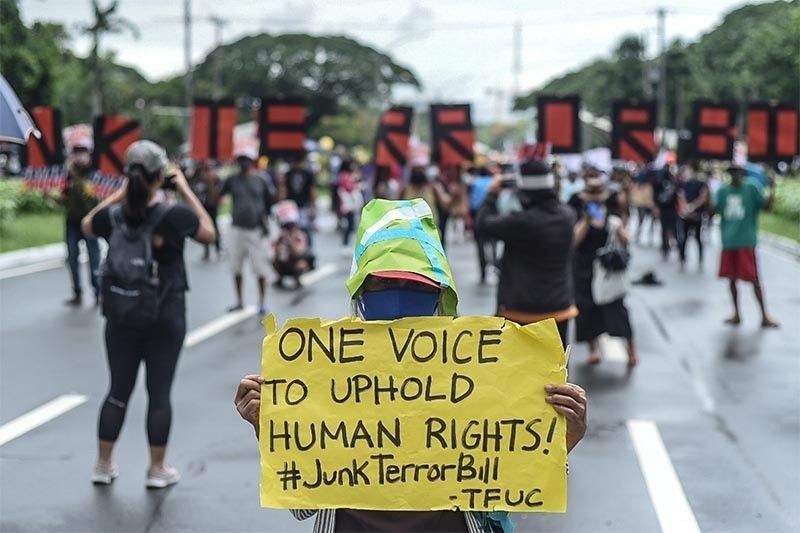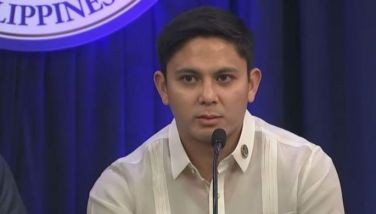SC leaves Anti-Terrorism Act of 2020 mostly intact

MANILA, Philippines (Updated 11:34 a.m.) — The Supreme Court has struck down parts of the feared Anti-Terrorism Act of 2020 as unconstitutional, a partial victory for 37 groups of petitioners that sought the nullification of the entire law, which is seen to have long-lasting effects on civil liberties in the Philippines.
The SC in an en banc session on December 7 voted 12-3 to declare as null parts of Section 4 that defines terrorism, particularly the proviso qualifying "advocacy, protest, dissent, stoppage of work, industrial or mass action, and other similar exercises of civil and political rights" that cannot be considered terrorism.
The proviso reads "...which are not intended to cause death or serious physical harm to a person, to endanger a person's life, or to create a serious risk to public safety" and the Supreme Court Public Information Office said that the court voted 12-3 to declare ir unconstitutional "for being overbroad and violative of freedom of expression."
The SC PIO said this was struck down and declared as unconstitutional “for being overbroad and violative of freedom of expression.”
Petitioners had wanted all of Section 4 struck down, but counsel Theodore Te said this still counts as an "important win as it strengthens the protections for civil liberties that the proviso in Section 4 carves out."
Designation
The court also voted 9-6 that allowing the Anti-Terrorism Council to adopt requests for designation by other jurisdictions or supranational jurisdictions is unconstitutional, the second method of designation under the law.
Under Section 25 of the ATA, the Anti-Terrorism Council, upon finding of probable cause, may designate individuals, groups, organizations and associations, whether domestic or foreign, as terrorists.
"The designation shall be without prejudice to the proscription of terrorist organizations, associations or groups of persons under Section 26 of this act," the provision further read.
One of the heavily assailed parts of Section 25, which petitioners wanted to be struck down in full, is the power given to the ATC under the section on designation of individual or groups, "upon finding of probable cause" is upheld.
During the oral arguments, justices raised that designation will have effect on the "reputation both of person and property of designate." Designation will result in the freezing of assets of the subjects.
Other challenged parts not unconsitutional
The SC PIO also said in its advisory: "On the basis of the current petitions, all the other challenged petitions of R.A 11479 are not unconstitutional."
It also advised the parties and the public to "await the publication and read the decision and the separate opinions for the explanation of votes."
This means that one of the heavily assailed provision of the law, Section 29, which allows law enforcers or military personnel to take custody of suspected terrorists for 14 days, extendible by another 10 days, before bringing them before judicial authorities, still stands.
Petitioners have raised fears that a person detained under Section 29 of the law may file a petition for a writ of habeas corpus but due to the law's wording, the writ will not be issued.
They have also raised that the contentious section of the law suspends the writ of habeas corpus for a maximum of 24 days even though there is no invasion and rebellion, which are requisites stated in the Constitution.
The privilege of the writ of habeas corpus may be suspended if any of the two requisites is present and if "public safety demands it."
More than a year of wait
This ends the more than a year-long wait of petitioners in their legal fight against the anti-terrorism law that, they argued, infringes on basic rights and is open for abuse to target dissenters and critics, many of whom have been labelled by the Duterte administration as rebels or rebel supporters.
Thirty-seven groups of petitioners pinned their hopes on the 15-member tribunal to have the anti-terrorism law stricken from the country's statute books. Despite several hours-long sessions of oral arguments and hundreds of pages of pleadings, they failed to win the vote of the court.
Two Aeta farmers were also charged with violating Section 4 of the law in 2020 and had been detained for nearly a year, only for the court to rule later that prosecution evidence was insufficient as the government accusers failed to prove the identities of the farmers as perpetrators of terrorism.
Among the fears that petitioners raised to SC is the red-tagging of progressives and dissenters, but this dangerous practice continued even as their arguments were heard by justices.
So far, the anti-terror council has designated the Communist Party of the Philippines, New People’s Army, National Democratic Front of the Philippines and 19 supposed members of the CPP as terrorists — among those designated are four peace consultants.
- Latest
- Trending





























